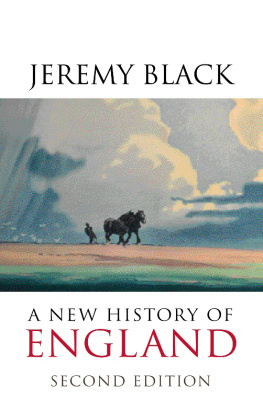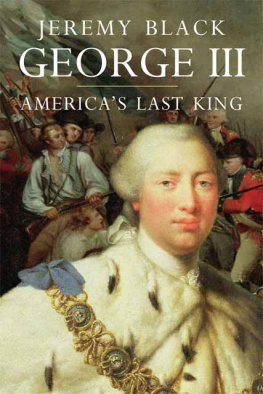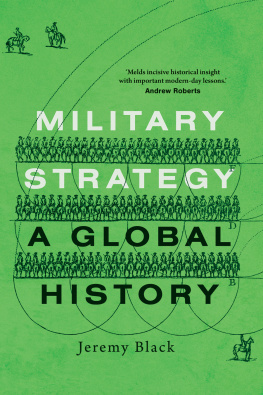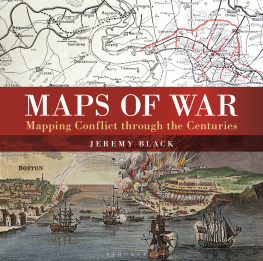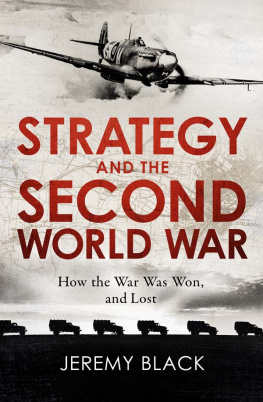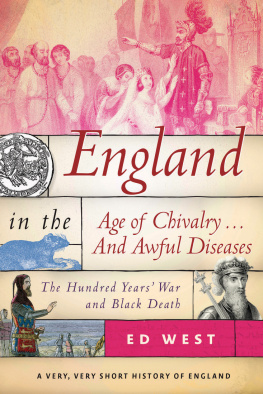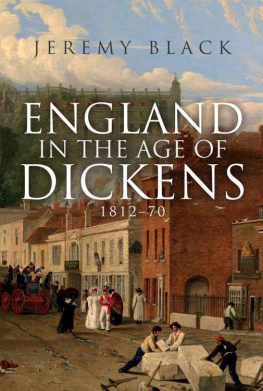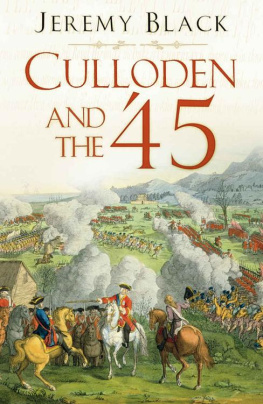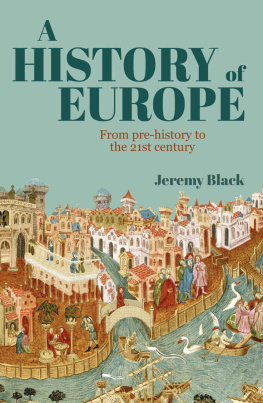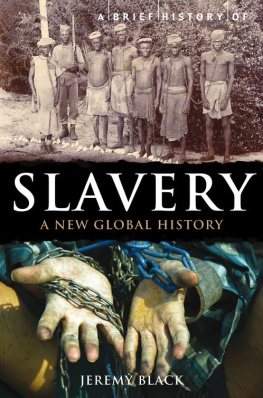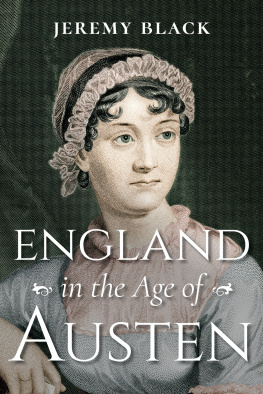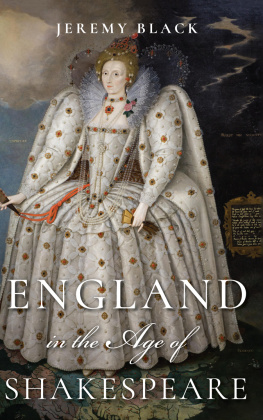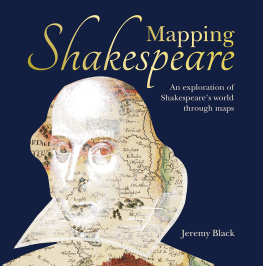A N EW H ISTORY
OF E NGLAND
A N EW H ISTORY
OF E NGLAND
JEREMY BLACK

First published in 2000
This revised second edition published in 2008
The History Press
The Mill, Brimscombe Port
Stroud, Gloucestershire, GL 5 2 QG
www.thehistorypress.co.uk
This ebook edition first published in 2013
All rights reserved
Jeremy Black, 2000, 2008, 2013
The right of Jeremy Black to be identified as the Author of this work has been asserted in accordance with the Copyrights, Designs and Patents Act 1988.
This ebook is copyright material and must not be copied, reproduced, transferred, distributed, leased, licensed or publicly performed or used in any way except as specifically permitted in writing by the publishers, as allowed under the terms and conditions under which it was purchased or as strictly permitted by applicable copyright law. Any unauthorised distribution or use of this text may be a direct infringement of the authors and publishers rights, and those responsible may be liable in law accordingly.
EPUB ISBN 978 0 7524 9624 5
Original typesetting by The History Press
C ONTENTS
J EREMY B LACK MBE is Professor of History at Exeter University. Among his many publications are the best-selling History of the British Isles (Macmillan), Culloden and the 45 (Sutton), Pitt the Elder: The Great Commoner (Sutton) and A New History of Wales (Sutton).
P REFACE
This is a new history of England for two linked reasons. The first, mundane, one is that I published a heavily-illustrated history of England in 1993, but the second reason is more important. The situation now appears different, in some important respects very different, to when I was writing in 1992. First and foremost, the future and identity of Britain or, to give the current full title of the state, the United Kingdom of Great Britain and Northern Ireland, have become unclear. This owes most to the process of devolution in Scotland and Wales, but also reflects growing interest in regional government. Second, the possibility that the process of Euro-convergence will dramatically alter the character of both England and Britain has become more pressing.
Thus, there is renewed interest in considering the identity of England and it is appropriate to offer an historical dimension to this question. Yet, that does not make clear how best to provide such a dimension, especially for the last three centuries. In particular, the relationship between the history of England and that of Britain, on which I have deliberately written separately, is unclear. Is the history of England that of Britain with the other bits left out? If not, how is a history of England to be written? The following is one scholars suggestion. Obviously it is not definitive. No work is. Even more so, the contracted length encourages a reflective approach. Many of the readers will be English. I hope that both they and others will consider how they would have written the book, because our different senses of the past, our past and that of others, register history and give it shape. The past provides the framework and vocabulary for experience, just as the future does for hope. By the standards of both, the present is generally found wanting, but past and future also exist in a counterpoint with each other. Those who fear the future tend to praise the past, while those who chart hopeful destinies for the future are often critical of the past. The curse of the past is particularly present for those who seek to empower themselves through past grievances, whether real or imagined; but to abandon history leads to the broken continuity with the past in which identities are lost and values atomised.
I would like to thank Christopher Feeney, a most sympathetic and helpful publisher, Helen Gray, Sarah Flight and Mary Critchley for their valuable editorial work at Sutton Publishing, and Bill Gibson and Robert Peberdy for their helpful comments on an earlier draft. I benefited from the advice of Nigel Aston, John Blair, Sue Bruley, Grayson Ditchfield, Joyce Ellis, Stephen Evans, John Gardiner, David Griffiths, Ann Hughes, Helen Jewell, Diarmaid MacCulloch, Don MacRaild, John Martin, Nigel Saul, Henry Summerson, David Taylor, Alex Walsham, Carl Watkins, Ann Williams, and Jenny Wormald on particular points and sections, and from the opportunity to develop ideas provided by invitations to give lectures in Cambridge, Oxford and on the Queen Mary II. This book is dedicated to two friends whose filmmaking combines clarity and accuracy to an exemplary decree. They are also fun people and wonderful hosts.
For Ron Blumer and Muffie Meyer
I NTRODUCTION
It is tempting in 2008 to offer a new history of England that focuses on how the past (and present) would have been different had England not been linked to other parts of the British Isles. Such an approach, that of the what if, for which the technical term is counterfactualism, can be attempted, in some cases with apparent precision. For example, it is possible to take electoral results and subtract those from non-English seats. These certainly suggest a very different national history. Conservatives and their allies would have won nearly every election in the last two centuries (although, of course, the shape of politics might have been very different had only England been at stake).
It is also possible, although far more difficult, to consider how English history would have been different without, for example, the (Welsh) Tudors and the (Scottish) Stuarts. More recently, over the last century, it is noteworthy how many politicians have come from outside England, and it is worth assessing how far politics would have been different without say Lloyd George. The modern Labour party has a particularly powerful Scottish tendency.
Envisaging different courses of political development relates to a wider question of national identity. In the twentieth century, English identity was frequently constructed, in other words formulated, in terms of images and values that were apparently redolent of a Southern identity. This could be seen, for example, in posters produced both during the major wars and in the inter-war period, with their reassuring, almost domestic, images of Southern Downland. The implicit, and, at times, explicit contrast was with the world of what was termed the Celt. In short, Scotland, Wales and Ireland were assumed to represent a very different culture.
This approach was misleading in a number of ways. Most seriously, it offered essentially unitary accounts both of England and of the Celtic world, and presented these as clearly contrasting. Such unitary accounts were inaccurate, as was the clear contrast. Furthermore, the combination led to the implication that elements that seemed similar to the other were, in some fashion, aberrations, even disloyal or traitorous. This could be seen in the depiction of the industrial regions of northern England as closer to the Celtic world than to English identity and interests: Tyneside, for example, having more in common with Clydeside than with Dorset.
Such an account receives some support from a unitary approach to history. If, for example, the identity of England in the nineteenth and twentieth centuries is to be electorally constructed around images of Southern Downland and/or successive Conservative victories, then Liberal and Labour heartlands indeed appear different because they overlapped considerably with the Celtic world. Yet, this is misleading, because national identity and interests are not uniform, in two senses: geographically uniform and consistent over time; nor are they uncontentious.
The attempt to imply that there is uniformity instead tells us more about images of Englishness, important and influential as they are, than it does about the far more complex reality of overlapping and often very different, if not contentious and clashing, senses of identity. Alongside nationhood, people can also identify through social structures, religion, gender, ethnicity and other factors, although there is a risk of putting excessive weight on modern ideas of self-identification through gender, ethnicity and other factors.
Next page
